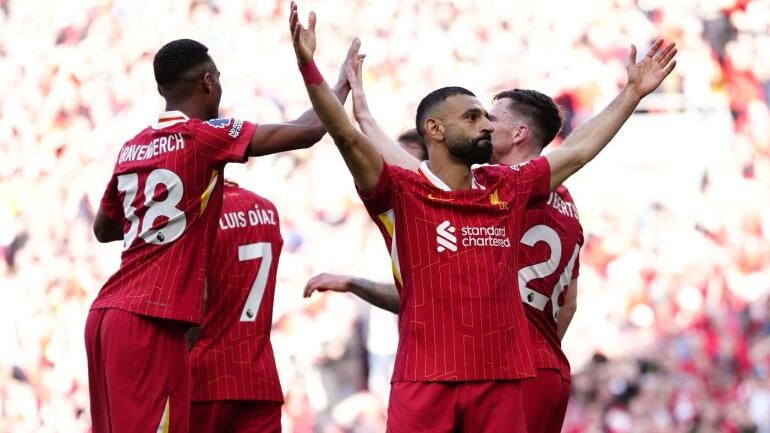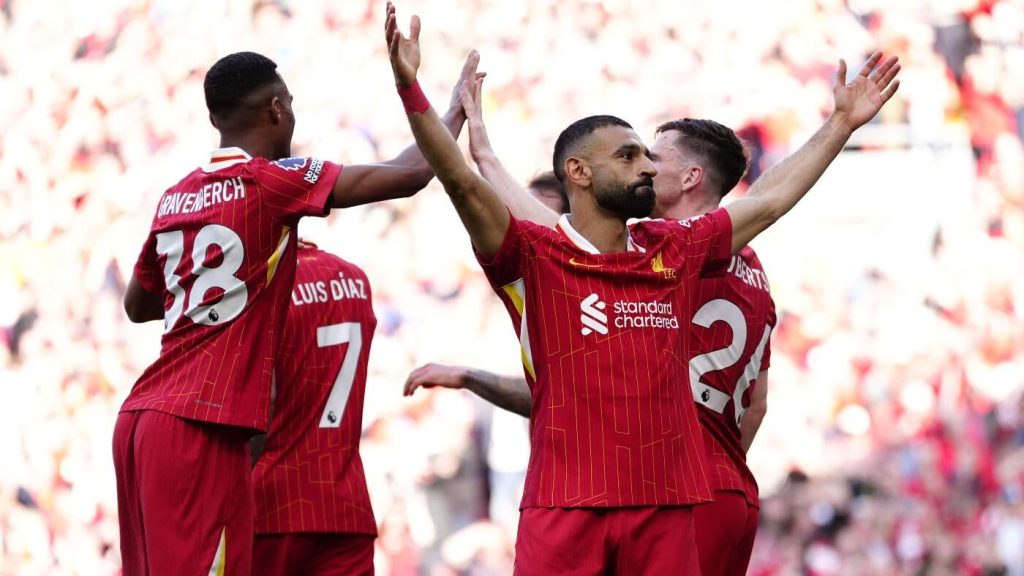Liverpool won their first league title in five years on Sunday

Months after building a commanding lead atop the Premier League table, Liverpool were officially crowned champions on Sunday following a 5-1 win against Tottenham Hotspur, completing the impressive feat in their first season under manager Arne Slot.
The final months of Liverpool’s title-winning run saw the team go into cruise control, surviving the few bumps along the way thanks to the unassailable lead they had built in the early parts of the season. It may have resulted in an anticlimactic end of sorts to the Premier League title race, though their surge to the top was not necessarily easy to predict at the start of the campaign.
It was unclear how quickly Liverpool would transition out of the Jurgen Klopp era, a nearly nine-year period that brought renewed success to the club that included one Premier League title, one UEFA Champions League trophy and two other trips to the final of Europe’s top club competition. Slot wasted no time at all settling in at Anfield, losing just one game across all competitions until early January. The Dutch manager, who had only coached in the Netherlands before his move to England, turned Klopp’s attack-minded team into one that had more restraint but achieved the same results when they were at their best. Their high-flying start ensured they had enough insurance to survive some bumps in the road later in the season, and that they would not end the season trophyless, even as they were eliminated from the FA Cup, UEFA Champions League and lost the EFL Cup final in the span of a few weeks in the winter.
As the celebrations begin in Liverpool, here’s a look back at the defining trends that fill in the context of the Reds’ title-winning run and ensured Slot’s first season at Anfield would be a successful one.
Mohamed Salah’s lights-out form
There was an element of surprise to Liverpool’s dominant title-winning run because it really did feel like a year of transition at the start. With very little action in the transfer market last summer, Slot would be working with a squad built with Klopp in mind, potentially delaying the process for the new manager to leave his mark on the team. There was also a layer of uncertainty that went hand-in-hand with that feeling of transition – Mohamed Salah and Virgil van Dijk, the veterans who were tasked to lead the way in a new era for Liverpool, were in the final year of their contract and there was a realistic chance that they would soon be on their way out.
The thing about transition, though, is that the line between the end of an era and the start of a new one is hard to predict beforehand, and the Reds’ bet that Salah had at least one more strong year in him was ultimately a good one. The most memorable aspect of Liverpool’s title-winning run will be that it was the showcase for arguably the greatest six months of Salah’s impressive career, a period in which the 32-year-old found the back of the net with impressive ease. His count, as it stands, is 33 goals and 33 assists across all competitions this season, a majority of which came from August through February. His form ultimately went hand-in-hand with Liverpool’s – their springtime skid coincided with his dry spell, though the early-season exploits made it irrelevant as far as their title run was concerned.
The run was enough to ensure Salah would ink a new two-year deal at Liverpool and thrust himself into the conversation for the Ballon d’Or, adding a new layer of excellence to a legacy that was already set. Whether or not Salah can maintain this form for another two years is a question for another time, but even if his role dwindles at Anfield, one thing is certain – as far as last dances go, this may just be as good as it gets from an individual standpoint.
Manchester City’s downward turn
There is another reason why Liverpool’s title run was unlikely – this trophy, once again, was Manchester City’s to lose. Pep Guardiola’s side were on a four-year Premier League-winning streak at the start of the season, and though there were questions about whether or not they could maintain their competitive edge for a fifth year running, few anticipated the drop-off that came this campaign.
Their season was first hampered by Rodri’s ACL injury in September, but a string of poor results last fall revealed that the issues were bigger than one player’s absence. Guardiola ruled them out of the title race before the new year, admitting there was “no chance” they could pull off the feat with City 14 points behind Liverpool in late December. He was not wrong – City will spend the final weeks of the Premier League season competing for a Champions League berth, which still is not a lock for them in an uber-competitive season partially inspired by their own poor form.
City’s dip also coincided with a weird year across the board for most of the Premier League’s top sides. Arsenal will likely earn a third successive second-place finish and were fairly consistent throughout the season, but never seriously challenged Liverpool for the title, while Chelsea actually embodied a year of transition in their first under manager Enzo Maresca. Manchester United and Tottenham Hotspur, meanwhile, have been doomed to bottom-half finishes after unusually poor campaigns in the Premier League this season. The Reds were, in a way, the only team up to the task and will walk away as deserving champions because of that.
Arne Slot’s strong first impression
If uncertainty was the theme of Liverpool’s season at the start, Slot was the personification of it. There were no questions that the ex-Feyenoord boss had earned a job like this one, winning the Eredivisie and KNVB Cup and demonstrating himself to be one of Europe’s next young managers. It was reasonable to account for an adjustment period, though, and Liverpool’s quiet summer felt like a signal that the team would not be transformed to suit Slot’s tactical vision immediately.
The new manager, though, hit the ground running and quickly showcased his managerial style despite working with a team that still reminded of Klopp’s approach. Slot implemented and instilled a pragmatic approach in short order without sacrificing the results, though his side averaged fewer shots than Klopp’s did the year before, the attacking output was similar during the first six months of the campaign. Even as things became more complicated in the back half of the season, Slot was able to demonstrate clearly that he belongs amongst Europe’s top ranks and is arguably the first of several young managers to successfully make the leap.
There will be new challenges ahead for Slot as soon as next season – this campaign’s bumps in the road are enough to prove that Liverpool could use some updates, which will accelerate the transition from the Klopp era to the Slot era. What the latter eventually looks like is a big question, but it makes the Reds a fascinating team to follow for years to come.











